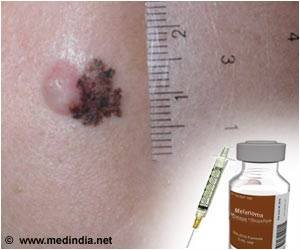Neoadjuvant Immunotherapy Effective in Stage III Melanoma

The data also build on recent encouraging results for single-agent neoadjuvant immunotherapy presented by MD Anderson at the European Society for Medical Oncology (ESMO) Congress 2022 for stage III-IV melanoma and stage II-IV cutaneous squamous cell carcinoma.
The study enrolled 30 patients at MD Anderson and Memorial Sloan Kettering Cancer Center to receive two doses of neoadjuvant relatlimab and nivolumab, followed by surgery and 10 doses of the same combination in the adjuvant setting. One patient developed a brain metastasis during neoadjuvant therapy and did not proceed to surgery. The median age of patients was 60, and 63% of patients were male.
Advertisement
After a median of 24.4 months follow-up in the 29 patients who underwent surgery, the rate of recurrence-free survival (RFS) was 97% at one year and 82% at two years. RFS rates were highest in patients with a pCR: 100% at one year and 91% at two years, compared to 92% and 69% in patients without a pCR. The one- and two-year overall survival rates for all patients were 93% and 88%, respectively.
No grade 3 or 4 IRAEs occurred during the eight weeks of neoadjuvant treatment. One patient’s surgery was delayed due to asymptomatic myocarditis, which was determined to be unrelated to treatment. During adjuvant therapy, 26% of patients developed grade 3 or 4 IRAEs, with secondary adrenal insufficiency and elevated liver enzymes being two of the most common side effects.
Stage III Melanoma: Phase 2 Study
The results are favorable in relation to two prior study arms, which assessed nivolumab either alone or in combination with the CTLA-4 checkpoint inhibitor ipilimumab. Those results, reported by Amaria and colleagues in Nature Medicine in 2018, showed a pCR rate of 45%, with 73% of patients experiencing grade 3 side effects in the combination arm. The nivolumab monotherapy arm achieved a pCR rate of 25%, with 8% of patients experiencing grade 3 side effects. The high toxicity rate led to early closure of the previous study.
“We’re very pleased to see that the combination of relatlimab and nivolumab balanced safety and efficacy, and it did not result in any delays to surgery,” Amaria said. “We want to provide patients with a treatment option that will help reduce the risk of their cancer returning after surgery. Our data complement the RELATIVITY-047 study results and provide further evidence to support the use of this combination in melanoma.”
Translational studies of blood and tissue samples revealed that a greater presence of immune cells at baseline and decreases in M2 macrophages during treatment were associated with pathological response. Pathologic response was not correlated with LAG-3 and PD-1 levels in baseline tumor samples. Further follow-up is needed to determine the impact on overall survival and biomarkers of response.
The study was funded by Bristol Myers Squibb (BMS). Amaria has worked in a consulting/advisory role for and received research/grant support from BMS. MD Anderson authorship included co-lead author Elizabeth Burton and co-senior authors Padmanee Sharma, M.D., Ph.D., Jennifer Wargo, M.D., and Hussein Tawbi, M.D., Ph.D. A full list of co-authors and disclosures can be found in the paper.
Source: Eurekalert
Source link
#Neoadjuvant #Immunotherapy #Effective #Stage #III #Melanoma



